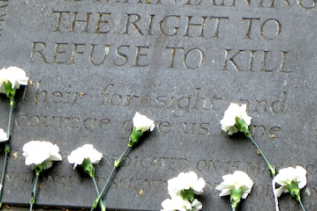Pope Francis on importance of listening to conscience

Pope Francis prayed the Angelus on Sunday with pilgrims gathered in St Peter’s Square. Before the prayers, the Holy Father spoke of the conscience as the interior space in which we can listen to and hear the truth, the good, the voice of God. Pope Francis praised his predecessor, Benedict XVI, as a model of docile attention to the voice of one’s conscience. “Pope Benedict XVI has given us a great example in this sense,” he said. “When the Lord had made it clear, in prayer, what was the step he had to take, he followed, with a great sense of discernment and courage, his conscience, that is the will of God speaking to his heart.” The full text follows:
Dear brothers and sisters,
This Sunday's Gospel (Lk 9:51-62) shows a very important step in the life of Christ: the moment in which, as St Luke writes, "[Jesus] steadfastly set His face to go to Jerusalem. (9:51 )” Jerusalem is the final destination, where Jesus, in his last Passover, must die and rise again, and so to fulfill His mission of salvation.
From that time, forth, after the steadfast decision, Jesus aims straight for the finish line, and even to the people he meets and who ask to [be allowed to] follow Him, He says clearly what are the conditions: not having a permanent abode; knowing how to detach oneself from familiar affections; not succumbing to nostalgia for the past.
Jesus also said to his disciples, charged with preceding Him on the way to Jerusalem to announce His coming, not to impose anything: if they do not find willing welcome, they are [simply] to proceed further, to move on. Jesus never imposes. Jesus is humble. Jesus extends invitations: “If you want, come.” The humility of Jesus is like this: He always invites us. He does not impose.
All this makes us think. It tells us, for example, the importance, even for Jesus, of conscience: listening in his heart to the Father's voice, and following it. Jesus, in his earthly life, was not, so to speak, “remote-controlled”: He was the Word made flesh, the Son of God made man, and at one point he made a firm decision to go up to Jerusalem for the last time - a decision taken in His conscience, but not on His own: with the Father, in full union with Him! He decided in obedience to the Father, in profound intimate attunement to the Father’s will. For this reason, then, was the decision was steadfast: because it was taken together with the Father. In the Father, then, Jesus found the strength and the light for His journey. Jesus was free. His decision was a free one.
Jesus wants us Christians to be free as he is: with that liberty, which comes from this dialogue with the Father, this dialogue with God. Jesus wants neither selfish Christians, who follow their egos and do not speak with God, nor weak Christians, without will: “remote-controlled” Christians, incapable of creativity, who seek ever to connect with the will of another, and are not free. Jesus wants us free, and this freedom – where is it found? It is to be found in the inner dialogue with God in conscience. If a Christian does not know how to talk with God, does not know how to listen to God, in his own conscience, then he is not free – he is not free.
So we also must learn to listen more to our conscience. Be careful, however: this does not mean we ought to follow our ego, do whatever interests us, whatever suits us, whatever pleases us. That is not conscience. Conscience is the interior space in which we can listen to and hear the truth, the good, the voice of God. It is the inner place of our relationship with Him, who speaks to our heart and helps us to discern, to understand the path we ought to take, and once the decision is made, to move forward, to remain faithful.
Pope Benedict XVI has given us a great example in this sense. When the Lord had made it clear, in prayer, what was the step he had to take, he followed, with a great sense of discernment and courage, his conscience, that is, the will of God that spoke to his heart – and this example of our father does much good to all of us, as an example to follow.
Our Lady, with great simplicity, listened to and meditated deep within herself upon the Word of God and what was happening to Jesus. She followed her Son with deep conviction, with steadfast hope. May Mary help us to become more and more men and women of conscience – free in our conscience, because it is in conscience that the dialogue with God is given – men and women able to hear the voice of God and follow it with decision.
Source: VIS


















